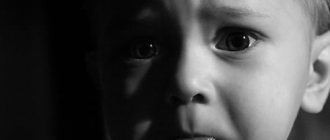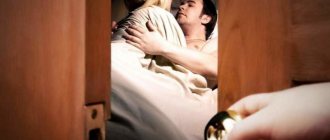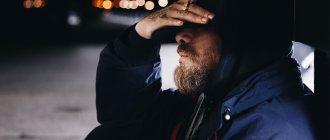Causes of fear of flying on an airplane
Each time, about 70% of those on board experience fear of flying of varying severity. Each passenger has their own reasons for concern.
Before diagnosing yourself with any fear, it is important to understand whether this is really a manifestation of a phobia or just anxiety caused by suspiciousness or a natural reaction of the body. A phobia is practically uncontrollable without the involvement of third-party means: other people, psychologists, medications. Fear can be completely controlled by the power of thought.
- Claustrophobia is the fear of closed spaces. Most note concerns associated with the small cabin of the airliner: low ceilings, narrow aisles, small distances between rows of seats. Even a huge Airbus may seem like a tiny box to those who know first-hand about claustrophobia.
- Acrophobia is a fear of heights and the sky. Persons familiar with the manifestations of this phobia are disturbed by a new environment for the body - air. The lack of solid soil under your feet, the awareness of a distance of 10 thousand meters above the ground, and especially the rise and fall of the airliner, when the window is full of lights of the runway, drives you into horror.
- Aerophobia is the name given to the fear of airplanes, flying and everything connected with them. Some people cannot understand the principle of moving an airplane through the air; others think that there won’t be enough oxygen there and you could suffocate. Sometimes even the size of the aircraft is intimidating.
- Distichiphobia - fear of disasters. Individuals with this phobia cannot calmly move not only by air: any transport causes anxiety and stress. Disasters and accidents happen everywhere. But when flying, everything is more complicated than in other situations: there are usually no survivors in plane crashes. Realizing this at an altitude of 10 km in an airplane seat makes the heart beat faster and the brain panic.
- The fear of losing control over the situation especially often accompanies avid motorists, machinists, and even sometimes the pilots themselves when they are among passengers. The inability to influence the situation can worry, in general, anyone who is used to leading and precisely controlling everything around them.
- Ochlophobia is often observed in those who do not like crowds. Actually, this is the fear of large crowds of people, unfamiliar company. The larger the liner, the more passengers it can accommodate. For those who are afraid of flying, it seems that this whole structure is too noisy, too heavy, unreliable, and other fears are added to ochophobia.
Most often, a phobia does not come alone. The more reasons to worry, the stronger the feelings, and the more difficult it is to cope with them alone. Features of the nervous system, and not just character and willpower, affect the ability to control oneself.
Flights are the safest method of mass transportation
You've probably heard that, according to statistics, airplane passengers have a much lower chance of getting into a plane crash than car drivers.
And guess what? This is actually true! World statistics won't lie, will they? As an example, consider the words of David Ropeik, a risk communication instructor at Harvard University: “...the odds of dying in a car accident are approximately 1 in 5,000 . The similar odds of being in a plane crash are approximately 1 in 11,000,000 .” The chance is so slim that Ropeik says you're hundreds of times more likely to be struck by lightning in your lifetime 1 in 13,000
However, we will not rely only on the data of one specialist. To do this, let’s go to the website avia.pro, which publishes a calculator for the probability of plane crashes.
So, according to this Internet portal, you can programmatically calculate the approximate chance of an accident during a flight:
“The program allows you to calculate the probability of a plane crash based on real factors. In order to find out the likelihood of a plane crash, you need to select an airline from the appropriate options, specify the model of the aircraft on which the flight will be made, specify the length of the route and a number of other parameters, after which you can obtain objective information about how safe your flight will be,” – says on the website https://avia.pro.
Well, let's check. Let's take one of the largest air carriers in the country - - and choose one of the proposed aircraft:
www.aeroflot.ru
We enter data into the online service: country, airline, aircraft model, flight range, time of year, age of the aircraft and others. To obtain averaged results, set the “statistical average” value. Thus, we get the following values:
Sukhoi Superjet 100 , the system gave a probability of a plane crash equal to 0.000275%
Boeing 777-300: 0.000278%
As you can see, the difference between the two popular aircraft today with identical input data is small. For the millions of flights flown annually around the world, there are indeed very few air transport accidents, taking into account many possible factors. Many times more residents of megacities are injured and killed when interacting with elevators.
Of course, these are not absolute values, but a comparison of two statistical samples leads to the main conclusion: the chance of dying in air transport is indeed incredibly low.
Main symptoms
The most common symptoms that people with fear of flying notice in themselves:
- The heartbeat quickens at the mere thought of the upcoming journey by air. Some people’s hearts skip a beat, even if the flight is only in a month;
- the desire to use the usual sedative, alcohol, smoke a cigarette, or use other attempts to calm down;
- dizziness accompanying tachycardia. Particularly impressionable people may even faint;
- due to the fear of flying, sweating increases: wet palms and armpits are faithful companions of those who are familiar with aerophobia;
- the body is in constant tension: endless audio (and if the window allows, then visual) control of the engine, convulsive reactions to any shaking, inability to sleep or simply switch attention;
- suspicion towards the crew: attempts to hear alcohol intoxication in the pilot’s voice, to read the terrible thoughts of the flight attendant, which she allegedly hides behind a smile;
- the turbulence zone, when the liner begins to shake, causes uncontrollable manifestations of phobia and the most terrible thoughts of death.
The chance of surviving a sudden emergency on board is 95%
Yes, an emergency situation may occur on board, but the chance of it transforming into a disaster will also be extremely low. Modern technology, assistance and autopilot systems contribute to this factor. And not just any person can become an active pilot. Airlines invest tens and hundreds of millions of rubles in personnel training and take safety very seriously.
Of course, certain problems and excesses on the ground are present all over the world, just remember the A320 crash near Digne-les-Bains, which resulted in the death of 150 people due to a mentally unstable pilot who decided to take his own life... But needless to say that Is this also an exception to the rule?
How to overcome the fear of flying on your own?
In fact, the fear of flying for most passengers is not a consequence of their own bad experiences. Most flights end safely, but those who experience aerophobia will feel restless and anxious again the next time they fly. Flying on an airplane for the first time and subsequent times is equally strange, because... The fear of flying begins in the head, and not after a failure in flight. Any fears can be overcome.
What to do before the flight?
It is worth approaching getting rid of phobias responsibly. If anxiety increases from thoughts about the upcoming flight, you need to:
- convince yourself that experiences are meaningless: they will not affect the flight, the pilot, the engines or the environment;
- remind yourself that thoughts are material, and you need to try to either think well about the upcoming flight or not at all;
- review aircraft safety data if your fear of flying is associated with the possibility of a crash, a terrorist attack, or birds flying into a turbine. Ask yourself: what exactly is bothering you? How airport employees protect the airliner from the threat of a terrorist attack, what methods are used to scare away birds, how the plane works, in a word, any information that sheds light on the unknown will help cope with anxiety;
- talk about your fears: to yourself, to a psychologist, to a friend or relative;
- do not look for information about plane crashes, do not watch or listen to the news. Information about the crash a couple of days before the flight will not be associated with you in any way. It will only increase anxiety;
- If you went to the doctor about anxiety, and he prescribed you sedatives, take the course shortly before the flight. Some sedatives have a cumulative effect: one pill won’t do any good, but a two-week course will certainly save you from wasting your nerves.
What to do during the flight?
To overcome your fear of flying on an airplane, you can:
- keep yourself busy. Take care of this in advance: favorite music, book, handicrafts and anything else depending on the possibilities during the flight. Switching thoughts is the best way to completely forget that you are on a plane;
- try reading af. You can come up with your own affirmation, as long as it really calms you down;
- breathing exercises enhance the effect of affirmations: inhale - hold your breath for 5 seconds - exhale - hold your breath for 4 seconds;
- Don't sit by the window. If you got a ticket near the window, try to change. Usually there are no problems with this; there are no fewer people who want to look out the window than those who are afraid;
- drink more water;
- sleep is one of the best ways to pass the time on the road and keep your nerves intact. Unfortunately, most aerophobes cannot sleep during a flight, even if they are very tired.
What to do with your time?
Best option:
- read a book. If you don’t have a book, literature in the pocket of the seat in front of you or a newspaper from the set that the flight attendant will definitely offer will do;
- gadgets in flight are the best friends of aerophobes. They cannot be used only during takeoff and landing. During the flight you can: read, listen to audiobooks, favorite music, movies on headphones. Play office games that take up all your attention. The main thing is to charge the device in advance;
- If flight conditions allow (it’s light on the plane or the lights are on), do some handicrafts. A favorite option for those who are patient and diligent, for whom fine motor skills calm rather than irritate;
- talk to the passenger next to you. Perhaps this is a very interesting person, and several hours of flight will seem like a couple of minutes;
- Confess to the flight attendant “I’m afraid to fly on an airplane.” Perhaps she will tell you what to do.
During turbulence
The plane tries to avoid air pockets as much as possible. If zones of rarefied air cannot be avoided, the liner shakes. Sometimes it happens, to the point of things falling off the shelves. These moments cause panic even among particularly resilient passengers.
To overcome the fear of turbulence during an airplane flight and survive it without nervous loss, you need to:
- listen to the flight attendant's instructions;
- do breathing exercises;
- read an affirmation about a safe flight;
- do not stand behind falling things until the display or flight attendant allows you to unfasten your seat belt;
Don't forget: the plane is designed to overcome turbulence zones. He is strong, the pilot knows what to do. Think about this constantly.
Medicines
Unfortunately, there is no effective and quick pill to help with the fear of flying on an airplane. You should not rely on medication, although taking mild sedatives on the eve of the flight may reduce anxiety. Consult a doctor: therapist, psychotherapist, neurologist.
We study aircraft design and the laws of physics
An effective method to reduce phobias to a minimum is to delve deeper into your knowledge of the subject. Answer all your questions:
- how the flight will take place;
- how the plane works, how it floats in the air;
- who ensures flight safety;
- what skills are required for pilots and flight attendants;
- why is it excluded that the pilot will be drunk;
- what is turbulence;
- how not to panic and not be afraid to fly on airplanes;
- how an airplane is protected from birds, lightning, and icing;
- and other points.
Prevention
There are many recommendations on how to effectively deal with aerophobia. It is recommended to follow these rules:
- Never be late for check-in at the airport.
- Choose seats on the plane closer to the nose of the plane, where there is less noise and less turbulence. It is better to sit in an aisle seat.
- If you feel panic approaching, you should practice breathing exercises. It is important to exhale deeply and inhale it calmly, doing this in a certain rhythm and concentrating on breathing.
- You should drink plain water during the flight, as alcohol may have a completely different effect than expected.
- You always need to think about what to do while flying. You can prepare an interesting movie or book that will distract you from your fears. It is important to switch your attention to the positive.
Professional help
If you can’t stop worrying and being afraid of flying on airplanes on your own, seek help from a specialist. High-quality help will help minimize the manifestations of fears. The main thing is to do this in advance, since the work to eliminate aerophobia can take a long time.
Which doctor should I contact?
The question of how to overcome a strong fear of flying on an airplane is dealt with by a psychologist and psychotherapist.
Advice from psychologists
Psychologists know how to get rid of aerophobia. There is a special algorithm, after going through which the client will be able to forget about the fear of flying or at least learn to control it.
- It’s better to get rid of the problem long before the flight. A week's therapy may not be enough;
- If after the first flight you realize that you are afraid, you should not wait for the second and third to be convinced of this. The sooner you get advice from a psychologist, the easier it will be to solve the problem;
- get ready for serious work with various tasks. The psychologist will ask you to open up, identify problems, and perhaps use technical means: flight simulators, computer or role-playing games related to airplanes.
Pilots' recommendations
Tips from pilots on overcoming the fear of flying on airplanes - a gold mine of knowledge from the most experienced in the matter of air travel:
- turbulence, even very strong, is not dangerous. Modern aircraft are equipped with a special piloting mode during air changes;
- lightning that strikes the plane will linger in the aluminum casing without damaging either the plane or passengers;
- a collision with a bird is almost impossible: in the area of the runway they are driven away by special devices, and at an altitude of 10 thousand meters birds do not fly;
- There are no particularly dangerous places on an airplane: they are all equally safe;
- all aircraft engines can fail only if the fuel runs out. But even this possibility is practically excluded: there is a fuel supply on each board;
- depressurization of the interior is also extremely unlikely;
- and it is certainly impossible to open the door or knock out the window during the flight;
- any suspicion of bad weather or the possibility of heavy icing of the runway or the airliner will lead to cancellation of the flight. The flight is allowed only with 100% confidence that everything will go smoothly;
- if the plane went around, it did it for the sake of safety, and not to scare passengers;
- nothing bad will happen if one of the passengers does not turn off the smartphone or other gadget during taxiing, takeoff, and landing. Don't throw your fists at him.
Pilots like to say: a plane feels best in the sky, so there is no reason not to trust it.
Are you afraid of flying on an airplane?
Not really
New treatment methods
Among modern ways to stop being afraid of flying on airplanes, the leaders are:
- training on flight simulators and virtual reality. You can feel yourself in any role: pilot, passenger, flight attendant. And in different situations: turbulence, a panicking passenger nearby, a calm environment, rain, thunderstorm, and so on;
- overcoming fear in practice. The client is invited to take a short flight on an airplane under the supervision of a specialist. He will tell you, give you advice, find the right words;
- hypnosis. Psychologists-hypnologists help in several sessions.
Which technique to choose is up to a specialist to decide. Trust him, and then you can easily trust the pilot and the airliner.
Treatment regimen for phobia
The classic treatment regimen consists of:
- Determining fears through conversation with the client. At this stage, it is important to trust the psychologist as much as possible to make it faster and easier to overcome the fear of flying.
- Choosing a treatment method: group or individual classes, action plan.
- Recording progress and dynamics of treatment.
- Checking the result in natural conditions: the client is asked to fly somewhere.
Signs of aerophobia
It should be understood that aerophobia is not an independent disease. It is rather a psycho-emotional disorder caused by the above reasons. Signs of this condition can be psychological and physical.
Psychological symptoms include:
- a feeling of anxiety that grips a person on the day of the flight or long before it;
- obsessive desire to study information about plane crashes;
- excessive dramatization of the situation, focusing on certain details that seem suspicious and dangerous;
- panic attacks that begin upon arrival at the airport.
Physical signs include:
- dizziness;
- excessive sweating;
- rapid pulse;
- dyspnea;
- a sharp jump in blood pressure;
- disorders of the gastrointestinal tract (diarrhea, vomiting);
- tension in muscles and joints;
- weakness;
- loss of consciousness.
What not to do?
Airlines, psychologists, and crew unanimously prohibit:
- drink alcohol before the flight in any quantity. Firstly, it will not save you from anxiety. Secondly, it can lead to violent behavior during the flight. Thirdly, they may simply not be allowed on the plane;
- exclude uncontrolled use of any medications. Firstly, you may be mistaken for drunk and not allowed on board. Secondly, the body under the influence of medications may not respond to a change of environment in the best way;
- smoke more than one cigarette every 30 minutes. Increased blood pressure will have a bad effect on the body at altitude;
- read disaster statistics before flying. Such reading is harmful, since it will not help get rid of fear, but will only create even more uncertainty.
Treatment with folk remedies
To reduce anxiety levels, you can use some folk remedies. However, they can only be effective with long-term and regular use.
- Valerian decoction . 2 tbsp. l. valerian root pour 400 ml of water and keep in a water bath for about 40 minutes. Infuse, strain and drink 50 ml every 3 hours.
- Motherwort decoction . 3 tbsp. l. motherwort herbs pour 1 liter of water and simmer in a water bath for 20 minutes. Strain, drink half a glass 5 times a day. You can add 20 g of hawthorn berries to the motherwort herb.
- Ginger tea . Pour boiling water over 20 g of ginger and leave. Drink 2 times a day, adding honey.
What happens if you don't treat your phobia?
If the fear of flying on an airplane is not overcome in time, the phobia will develop with unprecedented intensity. First, you will give up flying forever, depriving yourself of the chance to visit distant, interesting countries. Then the fear of flying will spread to earthly life: anxiety will manifest itself with each new disaster that you learned about from the news. The result is dispensary registration in the neurological department.
Aerophobia hidden inside will give impetus to the development of psychosomatic diseases of the heart or nerves.
If they do have to fly, people with a phobia stop sleeping at night because they cannot get rid of obsessive thoughts about the upcoming journey.
Aerophobia, like any other panic fear, interferes with normal life. You can easily get rid of the disease. The main thing is the desire and readiness of the client himself to change.











